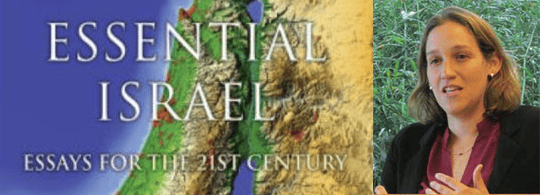Tuesday, November 14, 7:30 pm,Reba and Sam Sandler Family Campus
 Dr. Rachel Fish visits Tidewater to discuss her latest book, Essential Israel: Essays for the 21st Century, a compilation of essays from authors describing the cultural, political, and historical landscape of Israel.
Dr. Rachel Fish visits Tidewater to discuss her latest book, Essential Israel: Essays for the 21st Century, a compilation of essays from authors describing the cultural, political, and historical landscape of Israel.
This is the second part of the Community Relations Council’s conversation with Fish. The first part appeared in the October 23, 2017 issue of Jewish News.
Community Relations Council: As an educator on a college campus, what is your advice for college students as it relates to Israel?
Fish: College students need to understand their own university community because all are unique. They need to know that community and have a sense for who their allies are, in terms of talking about Israel, who their friends are, and where one might find challenges. That has to be understood on a multi-level system— administrative level, organizations, and student groups, faculty, board of trustees, donors. Most students, and people for that matter, don’t think about these issues when they’re searching for universities, but it should be part of the equation. It has become politically acceptable and politically correct within the university to engage in highly politicized discussions on Israel. Among many faculty, it has become the accepted position that it’s ok to talk about Israel being an anachronistic state and not necessarily having a right to exist like all other states. I don’t think most Jewish students are prepared for that discussion because they’re not comfortable or confident in their own knowledge.
Why are people’s opinions on the political landscape of Israel so polarized?
The culture in which we live at the moment is less informed and more strident, and most don’t feel like they have to have knowledge to form an opinion. [They] are comfortable in their Facebook feed, which are often used as echo chambers. It’s hard for many communities and individuals to have a serious and sophisticated discussion that doesn’t become an attack. It’s become the lightning rod for a lot of emotion—one of many within the Jewish community. There has to be serious deliberations where people have to be grounded in knowing something and have to be engaged in empathetic/active listening. We can have different perspectives that we don’t all necessarily have to agree with, but need to be voiced in a civil way, without the intention of trying to convince the other. I don’t see many students who are actual critical thinkers these days—they assume things are legit, but don’t have ability to judge and question what is true.
What did you learn through this process in working with the various authors and reading/hearing their voices?
We were trying to find individuals who knew these issues [as it relates to Israel] and have written seriously about these issues, and also understand how to write for an audience that is not only in the ivory tower. We worked very closely with these experts to ensure that the narrative was one people could easily read despite whatever backgrounds they did or did not have. We learned that as we were preparing, there really isn’t any text like this. There are lots of historical works, huge tones immersed in Israeli history, but most people won’t read that today. We wanted to be able to find a way to address some of the most important and critical questions, but animated to ask questions that are relevant and impacting communities both in Israel and abroad in the 21st century.
For more information or to RSVP (required) for this free and open to the community event, visit JewishVA.org/IsraelToday.
– Wendy Weissman, Assistant Director CRC

